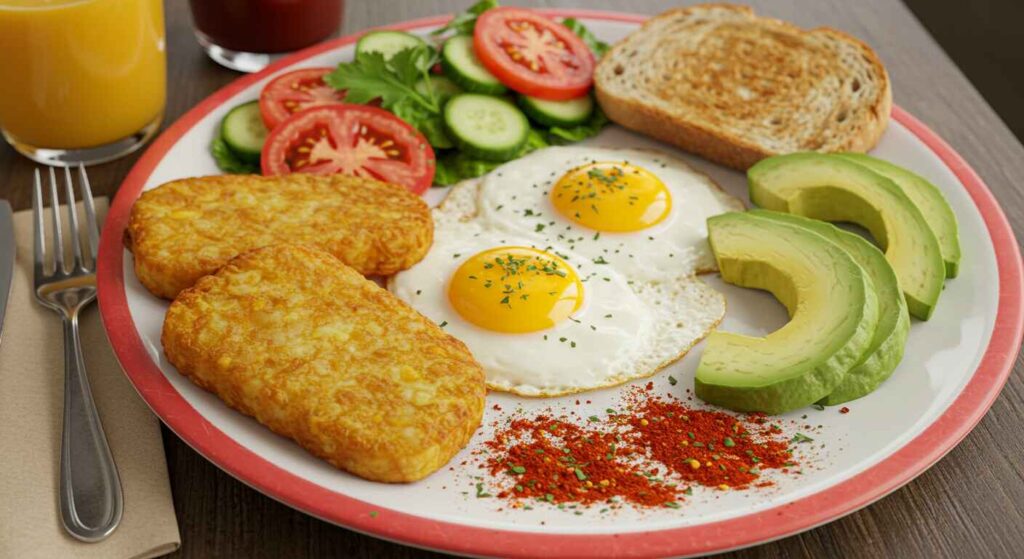Why You’ll Love This Recipe
Over hard eggs are a breakfast classic, simple, satisfying, and endlessly versatile. With firm yolks and tender whites, they’re perfect for sandwiches, meal prep, or a hearty morning plate. This guide will walk you through the steps to achieve perfectly cooked over hard eggs every time.
Table of Contents
Pure Comfort
There’s something comforting about the simplicity of over hard eggs. Whether paired with toast, nestled in a breakfast sandwich, or served alongside crispy bacon, they offer a reliable and delicious start to your day.
Ingredients
- Fresh large eggs
- Butter or oil (such as avocado oil)
- Salt and pepper, to taste
What You Need
- Non-stick or well-seasoned cast iron skillet
- Spatula (preferably silicone or rubber)
- Small bowl (optional, for cracking eggs)
Time to Cook
- Preparation: 2 minutes
- Cooking: 4-5 minutes
- Total: Approximately 7 minutes
Steps to Make It
- Preheat the Pan: Place your skillet over medium heat and add butter or oil. Allow it to heat until the butter foams or the oil shimmers.
- Crack the Eggs: Carefully crack the eggs into the skillet. For better control, you can crack them into a small bowl first and then pour them into the pan.
- Break the Yolks: Use a spatula or the tip of a knife to gently pierce the yolks, allowing them to spread slightly. This ensures even cooking.
- Cook the First Side: Let the eggs cook undisturbed until the whites are set and the edges begin to crisp, about 2-3 minutes.
- Flip the Eggs: Carefully flip the eggs using your spatula. Cook for an additional 1-2 minutes, or until the yolks are fully cooked through.
- Season and Serve: Season with salt and pepper to taste. Serve immediately for the best texture and flavor.
Make It Perfect

- Use Fresh Eggs: Fresh eggs hold their shape better and result in neater frying.
- Control the Heat: Medium heat prevents the eggs from overcooking or becoming rubbery.
- Non-Stick is Key: A non-stick or well-seasoned cast iron skillet ensures easy flipping and minimal sticking.
- Butter vs. Oil: Butter adds richness, while oils like avocado oil have a higher smoke point and neutral flavor.
Mix It Up
- Spice It Up: Sprinkle with paprika, chili flakes, or your favorite seasoning blend for added flavor.
- Herbaceous Touch: Add chopped herbs like chives, parsley, or dill after cooking for freshness.
- Cheesy Delight: Top with shredded cheese during the last minute of cooking for a melty finish.
Perfect Partners
- Toast: Whole grain, sourdough, or rye toast complements the eggs perfectly.
- Avocado: Sliced or mashed avocado adds creaminess and healthy fats.
- Breakfast Meats: Bacon, sausage, or ham make for a hearty pairing.
- Fresh Fruit: Balance the meal with a side of berries, melon, or citrus.
Busy Day Hero
Over hard eggs are quick to prepare, making them ideal for busy mornings. Their firm texture also means they can be eaten on the go, in sandwiches or wraps, without the mess.
Work Ahead
You can cook over hard eggs in advance and store them in the refrigerator for up to 3 days. Reheat gently in a skillet over low heat or in the microwave for 15-20 seconds.
Save Some For Later
Store cooked over hard eggs in an airtight container in the refrigerator. For best quality, consume within 3 days.
Everyone’s Happy
Over hard eggs cater to various dietary preferences and are a hit with both kids and adults. Their versatility makes them suitable for numerous dishes and occasions.
Good For You Too
Eggs are a powerhouse of nutrition, providing high-quality protein, essential vitamins, and minerals. They contain choline, important for brain health, and antioxidants like lutein and zeaxanthin, which support eye health.
Easy Clean Up
Using a non-stick skillet and minimal utensils means cleanup is a breeze. A quick wipe or rinse is often all that’s needed.
Switch It Up
- Egg Sandwich: Place over hard eggs in a toasted English muffin with cheese and bacon.
- Salad Topper: Slice and add to salads for extra protein.
- Rice Bowl: Serve over steamed rice with sautéed vegetables and a drizzle of soy sauce.
- Burgers: Top your burger with an over hard egg for added richness.
Simply Perfect
Sometimes, simplicity is best. A perfectly cooked over hard egg, seasoned with just salt and pepper, can be deeply satisfying.
Frequently Asked Questions About Eggs Over Hard
Let’s finish up with some commonly asked questions about cooking eggs over hard. These FAQs will help you become an eggs-over-hard expert in no time! 😎
Can I make eggs over hard without flipping them?
Good question! While flipping is traditional for eggs over hard, there’s a way to make them without actually flipping the egg. You can cook the egg on low heat with a lid on the pan, allowing the steam to cook the top of the egg until the yolk firms up. This method is perfect if you’re worried about breaking the yolk while flipping!
How do I know when my egg is perfectly cooked over hard?
The key to perfect eggs over hard is patience! The whites should be fully set and opaque, with no raw areas remaining. The yolk should feel firm when lightly pressed with a spatula but not overcooked to the point of being dry. If you’re not sure, a gentle poke with a fork can help you check the firmness of the yolk. If it feels too soft or liquid, give it another 30 seconds.
Can I add seasonings to my eggs over hard?
Absolutely! Adding seasonings like salt, pepper, paprika, or garlic powder is a great way to enhance the flavor of your eggs. You can also sprinkle some fresh herbs like parsley or chives for extra color and taste. Don’t forget to add a touch of hot sauce or salsa if you like a bit of spice!
Can I cook eggs over hard in advance?
While fresh eggs are always the best option, you can definitely cook eggs over hard in advance. Just make sure to store them in an airtight container in the fridge. When you’re ready to eat, simply reheat them in a skillet on low heat, so they don’t dry out. However, the texture may not be quite as perfect as when freshly cooked.
What’s the difference between eggs over hard and eggs over easy?
Great question! The difference lies in how long the yolk is cooked. Eggs over easy have a soft, runny yolk, while eggs over hard are cooked until the yolk is fully set and firm. Essentially, eggs over easy are the gentler, less cooked version, while eggs over hard are more cooked through and firm.

Over Hard Eggs: Everything You Need To Know For A Perfect Breakfast
- Total Time: 7 minutes
- Yield: 1–2 servings
- Diet: Vegetarian
Description
Over hard eggs are the no-fuss, classic breakfast staple with a firm yolk and crispy edges. Unlike their runny-yolk cousins, over hard eggs are flipped and cooked until the yolk is completely set—ideal for those who prefer a fully-cooked, mess-free egg that still delivers flavor, richness, and satisfaction. Whether you’re layering them in a sandwich or pairing them with toast and bacon, these eggs are quick, customizable, and downright comforting.
Ingredients
| Large eggs | 2 |
| Unsalted butter OR olive oil | 1 tsp |
| Salt | To taste |
| Black pepper | To taste |
Instructions
Preheat the pan
Place a non-stick or well-seasoned cast-iron skillet over medium heat. Add butter or oil and let it heat until shimmering or slightly foamy.Crack the eggs
Crack the eggs directly into the pan, or into a small bowl first if you want more control.Break the yolks
As soon as the whites begin to set, use the edge of a spatula to gently pierce and break the yolks. Lightly spread them out for even cooking.Cook the first side
Let the eggs cook undisturbed for about 2–3 minutes, until the whites are completely opaque and the edges begin to brown slightly.Flip carefully
Gently slide your spatula under each egg and flip. Cook the second side for another 2–3 minutes until the yolk is fully cooked through and firm.Season and serve
Sprinkle with salt and pepper to taste. Serve immediately with your favorite sides or inside a breakfast sandwich.
Notes
No Butter? Use olive oil or avocado oil for a healthier alternative.
Want Crispier Edges? Let the eggs sit slightly longer before flipping for golden, crispy sides.
Add-ons: Sprinkle in garlic powder, paprika, or a touch of chili flakes for an extra kick.
Serving Idea: Stack your over hard eggs on toast with mashed avocado, tomato, and arugula for a protein-packed breakfast.
Meal Prep: Make a batch ahead of time and store in the fridge for up to 3 days.
- Prep Time: 2 minutes
- Cook Time: 5 minutes
- Category: Breakfast
- Method: Pan-Frying
- Cuisine: American
Nutrition
- Serving Size: 2 eggs
- Calories: 180 kcal
- Sugar: 0 g
- Sodium: 120mg
- Fat: 14g
- Saturated Fat: 5g
- Unsaturated Fat: 8g
- Trans Fat: 0g
- Carbohydrates: 0.6g
- Fiber: 0g
- Protein: 12g
- Cholesterol: 370 mg

